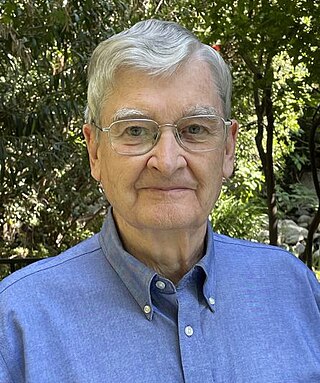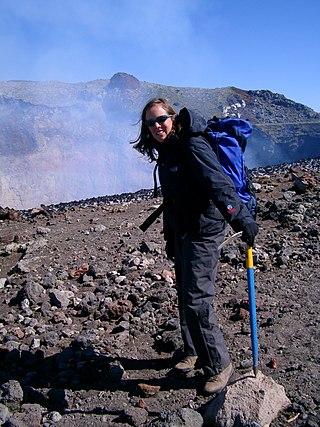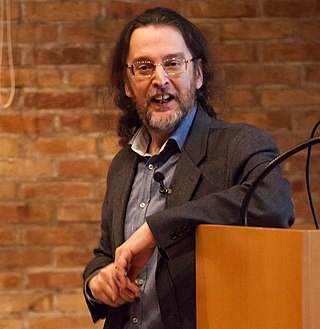Related Research Articles

Geophysics is a subject of natural science concerned with the physical processes and physical properties of the Earth and its surrounding space environment, and the use of quantitative methods for their analysis. Geophysicists, who usually study geophysics, physics, or one of the earth sciences at the graduate level, complete investigations across a wide range of scientific disciplines. The term geophysics classically refers to solid earth applications: Earth's shape; its gravitational, magnetic fields, and electromagnetic fields ; its internal structure and composition; its dynamics and their surface expression in plate tectonics, the generation of magmas, volcanism and rock formation. However, modern geophysics organizations and pure scientists use a broader definition that includes the water cycle including snow and ice; fluid dynamics of the oceans and the atmosphere; electricity and magnetism in the ionosphere and magnetosphere and solar-terrestrial physics; and analogous problems associated with the Moon and other planets.
Dan Peter McKenzie is a Professor of Geophysics at the University of Cambridge, and one-time head of the Bullard Laboratories of the Cambridge Department of Earth Sciences. He wrote the first paper defining the mathematical principles of plate tectonics on a sphere, and his early work on mantle convection created the modern discussion of planetary interiors.
Sir Nicholas John Shackleton was an English geologist and paleoclimatologist who specialised in the Quaternary Period. He was the son of the distinguished field geologist Robert Millner Shackleton and great-nephew of the explorer Ernest Shackleton.
Ekhard Karl Hermann Salje, FRS is an Emeritus Professor, and formerly Professor of Mineralogy and Petrology and Head of the Department of Earth Sciences, Cambridge University.
Jonathan David Blundy FRS is Royal Society Research Professor at the School of Earth Sciences at the University of Oxford and honorary professor at the University of Bristol.
William Alexander (Alex) Deer FRS was a distinguished British geologist, petrologist and mineralogist.

George R. Rossman is an American mineralogist and the Professor of Mineralogy at the California Institute of Technology.

Robert Miller Hazen is an American mineralogist and astrobiologist. He is a research scientist at the Carnegie Institution of Washington's Geophysical Laboratory and Clarence Robinson Professor of Earth Science at George Mason University, in the United States. Hazen is the Executive Director of the Deep Carbon Observatory.
Iron(II,III) sulfide is a blue-black (sometimes pinkish) chemical compound of iron and sulfur with formula Fe3S4 or FeS·Fe2S3, which is much similar to iron(II,III) oxide. It occurs naturally as the sulfide mineral greigite and is magnetic. It is a bio-mineral produced by and found in magnetotactic bacteria. It is a mixed valence compound, featuring both Fe2+ and Fe3+ centers, in 1:2 ratio.

Sir Alexander Norman Halliday is a British geochemist and academic who is the Founding Dean of the Columbia Climate School, and Director of the Earth Institute at Columbia University. He joined the Earth Institute in April 2018, after spending more than a decade at the Department of Earth Sciences at the University of Oxford, during which time he was dean of science and engineering. He is also a professor of Earth and Environmental Sciences at Columbia University.
The Mineralogical Society of Great Britain and Ireland began in 1876. Its main purpose is to disseminate scientific knowledge of the Mineral Sciences (mineralogy) as it may be applied to the fields of crystallography, geochemistry, petrology, environmental science and economic geology. In support of this vision, the society publishes scientific journals, books and monographs. It also organizes and sponsors scientific meetings, and the society connects with other societies which have similar scientific interests. Some of these other societies are the International Mineralogical Association, the European Mineralogical Union, the Mineralogical Society of America, the Mineralogical Association of Canada, the Geological Society of London, IOM3, the North of England Institute of Mining and Mechanical Engineers and the Microbiology Society.
Marie Edmonds is a professor of volcanology and geology in the Department of Earth Sciences at the University of Cambridge whose research focuses on the physics and chemistry of volcanic eruptions and magmatism and understanding volatile cycling in the solid Earth as mediated by plate tectonics. She is interested in the social and economic impacts of natural hazards; and the sustainable use of Earth's mineral and energy resources. Professor Edmonds is the Vice President and Ron Oxburgh Fellow in Earth Sciences at Queens' College, Cambridge; and the Deputy Head of Department and Director of Research at the Earth Sciences Department, University of Cambridge.

Tamsin Alice Mather is a British Professor of Earth Sciences at the Department of Earth Sciences, University of Oxford and a Fellow of University College, Oxford. She studies volcanic processes and their impacts on the Earth's environment and has appeared on the television and radio.
Suzanne Mahlburg Kay is the William & Katherine Snee Professor of Geological Sciences at Cornell University. She studies the origin and evolution of the continental crust. She is a Fellow of the Geological Society of America, the American Geophysical Union and the Mineralogical Society of America.
Barbara Ann Maher is a Professor Emerita of Environmental Science at Lancaster University. She served as director of the Centre for Environmental magnetism & Palaeomagnetism until 2021 and works on magnetic nanoparticles and pollution.
Marian Barbara Holness is a Professor in the Department of Earth Sciences at the University of Cambridge.
Melinda Darby Dyar is a planetary geologist, mineralogist, and spectroscopist whose research relates to the evolution of the Solar System. She studies the redox state of iron and the abundance of hydrogen using Mössbauer, x-ray absorption, and FTIR spectroscopy in the Solar System planets, specifically Earth, Moon, Mars, Mercury, and Venus.
Catherine G. Constable is an Australian earth scientist who is a professor at the Scripps Institution of Oceanography. Her research considers palaeo- and geo-magnetism. Constable was awarded the American Geophysical Union William Gilbert Award in 2013 and elected Fellow of the American Association for the Advancement of Science in 2017.

Melinda Jane Duer is Professor of Biological and Biomedical Chemistry in the Department of Chemistry at the University of Cambridge, and was the first woman to be appointed to an academic position in the department. Her research investigates changes in molecular structure of the extracellular matrix in tissues in disease and during ageing. She serves as Deputy Warden of Robinson College, Cambridge. She is an editorial board member of the Journal of Magnetic Resonance.

Ross John Angel is an internationally recognized researcher in mineralogy, expert in crystallography and elastic properties of geological materials and key industrial materials, which he studies with experimental and analytical approaches. He is the lead author or co-author of over 240 articles in international scientific journals, he received the Dana Medal from the Mineralogical Society of America in 2011 and is currently a director of research at the Institute of Geosciences and Geo-resources of the National Research Council (Italy).
References
- ↑ "Professor Richard Harrison | St Catharine's College, Cambridge". www.caths.cam.ac.uk. Retrieved 16 September 2021.
- ↑ Administrator (8 April 2020). "Origins of Earth's magnetic field remain a mystery". www.esc.cam.ac.uk. Retrieved 16 September 2021.
- ↑ Harrison, Prof Richard J. (24 January 2015). "Professor Richard Harrison". www.esc.cam.ac.uk. Retrieved 16 September 2021.
- ↑ Administrator (10 July 2019). "Professor Richard Harrison appointed Head of Department". www.esc.cam.ac.uk. Retrieved 16 September 2021.
- ↑ "Past recipients of the Max Hey Medal". Mineralogical Society of Great Britain and Ireland. Retrieved 13 May 2023.
- ↑ McEnroe, Suzanne A.; Harrison, Richard J. (2007). "Harrison receives 2006 William Gilbert Award". Eos, Transactions American Geophysical Union. 88 (16): 184. Bibcode:2007EOSTr..88..184M. doi: 10.1029/2007EO160011 . ISSN 2324-9250.
- ↑ Redfern, Simon (May–June 2008). "Presentation of the Mineralogical Society of America Award for 2007". American Mineralogist. 93 (5–6): 958. Bibcode:2008AmMin..93..958R. doi:10.2138/am.2008.519.